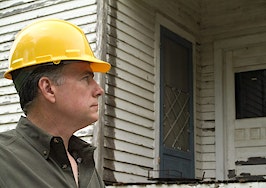Just as walking through a kitchen doesn’t make you a chef, living in a neighborhood doesn’t make an agent a “neighborhood expert.”
The information age is firmly ensconced in the real estate word. Long gone are the days when agents were the gatekeepers of the data.
The days of multiple listing service books printed quarterly and carried around like bags of gold, only to be viewed by those with “access,” are a bad memory.
For the most part, the public has as much or more information available for use as Joe Agent. And that is a very good thing.
The real estate industry excels at public relations. Was there ever a time when any real estate organization, now or in the past, didn’t trumpet that “it’s a great time to buy”?
Even during the crash and years of bottom scraping, that shrill message remained.
The “recovering” market of the last year has launched new ads, rallying calls, and, of course, brought back “local” agents who represent themselves as “neighborhood experts.”
All of which is nonsense, because … see the first sentence.
An expert is defined as “a person who has a comprehensive and authoritative knowledge of or skill in a particular area. Experts have a prolonged or intense experience through practice and education in a particular field.”
Using this definition, it’s reasonable to assume that an “expert” agent would have many years of experience, and a fairly comprehensive body of work.
Every definition of “expert” focuses on a skill — not “how long they have lived and worked in Anytown, USA.”
Experience and knowledge seem to play a larger role than where someone lives.
But what does the “neighborhood expert” tell buyers and sellers?
“I live here and know this community cold … My kids went to that school … Homes here sell so fast … They’re building a new mall in the area that will make this area even more desirable … We’re recovered and are back on the increase.”
Buyers and sellers should ask themselves:
- Can’t any agent, or anyone, collect demographic data on the community?
- Can’t any agent, or anyone, collect school data on the community?
- Has anyone, anywhere, been able to guarantee anything when it comes to development? How did that work during the boom? With guaranteed appreciation?
- The market has “recovered”? Real estate works at the micromarket level. The last five years have forever changed the business. Washington now controls things, and Washington has a track record.
“This is a very unique area, you need local expertise.”
Perhaps. But consider:
- Is the “neighborhood agent” that expert? Why? No other agent can put the home in the MLS?
- What’s unique about the area? What impact will it have on the big picture?
- Is the “neighborhood expert” so focused that they don’t have a larger perspective? What about competing areas, and how they impact the process?
- What about potential appraisal issues? If “unique” is taken literally, does the “neighborhood expert” understand the appraisal process? Are they the only ones to speak about it?
“I have sold homes in this community for years.”
OK, but:
- How many and how recently?
- Full time or opportunity agent?
- References? Source of business? Overall volume? Reputation in the industry?
- Competing markets? Will the seller or buyer miss other opportunities due to a myopic “neighborhood agent” view? Will the home seller have unrealistic expectations planted?
“I have buyers just waiting for homes to buy right here.”
Sure you do:
- Listings that don’t require agents to move around much are always welcomed by the “neighborhood agent.”
- A variation of the “we need homes” nonsense is basic marketing and something that’s drilled into every agent’s head. The objective is to get a sign in the yard.
- Is it reasonable to assume that when the home hits the MLS that all buyers in that and similar neighborhoods will be interested?
“This area/house/lot is worth … because I KNOW this market.”
This is perhaps the single most damaging claim the “neighborhood expert” will make, because:
- Agents “know” nothing, the market knows everything. The buyers are the market and they talk — “neighborhood expert” may not want to listen.
- Without recent data suitable for use in an appraisal, this is highly irresponsible to say but routinely done.
- This approach — opinion before data — is especially common with custom homes and second homes. “Neighborhood expert” won’t hesitate to manipulate or dismiss data that doesn’t fit their opinion.
Here’s a rather common scenario:
The “neighborhood expert” wants to remain noticed in their circles, and takes a listing and prices it to please the owner and others in the circle. Offers continue to come in below list, but the offers can be supported by market data.
The “neighborhood expert” becomes indignant with buyer’s agents presenting offers, and continues to ignore data in favor of their opinion. The neighborhood expert representing the seller continues to respond with, “Yeah, but …” and “The owner has X dollars into it. …”
The home languishes, eventually either expiring or selling where the market dictates.
The “neighborhood expert” assigns blame, saying something like, “The buyers just don’t recognize the value … the market this and that,” and convinces the client that the agent is not at fault.
The “neighborhood agent” can argue that they didn’t accept a “lowball” offer, and can continue to solicit business and say that they “know the real value” of the community.
To be clear, agents shouldn’t work outside of areas that they have experience in.
But even though areas like Atlanta, Boston, Los Angeles and New York encompass large geographical areas, experienced full-time agents with a solid grasp of real estate data can effectively research trends and advise clients across these areas.
That’s assuming that:
- Agents self-regulate in terms of time, distance and skill. Assistance should be solicited if required, or the file referred to another agent if needed.
- Adequate and appropriate data exists to formulate sound opinions.
- Recommendations to the client are based on data, not baseless opinions.
- The client understands the data and the opinions of the agent.
- The client is aware of the agent’s credentials and is satisfied with them.
Transparency is very much alive in the current real estate environment. Homebuyers and sellers have the ability to access every bit as much information as any agent does.
The proper application of that information is the key. Walking into a fully stocked kitchen does not make a chef. Having data is important, but applying it properly to the situation is the key to real estate success.
The single most important aspect of a successful real estate transaction begins with the client ensuring that a qualified, experienced real estate agent is selected. In the meantime, the more the public demands of the real estate industry, the better things will be.
Hank Miller is an associate broker and certified appraiser in Atlanta, Ga. The lead agent for HMT Atlanta, he’s known for his candid opinions and real estate expertise.







